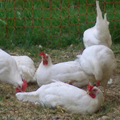A long running dispute about laying hens is laid to rest
Organic livestock farming contributes to reduced antibiotic resistance
19.05.2009, Press releases
Is organic livestock farming really better than battery keeping? Or is the price we pay for “happy hens” on organic farms an increased level of pathogens in eggs and hen populations? Animal hygienists of the Technische Universität München (TUM) have finally resolved this dispute – and given the all-clear signal. Hens and eggs from organic farms do not show a higher prevalence of bacteria than those from conventional farms. Furthermore, bacterial stems that do appear in organic animal keeping have a much lower incidence of antibiotic resistance. And that is a true consumer health benefit.
The question about the ideal approach to keeping laying hens has been at the center of heated debate for many years. Proponents of organic farming systems pound the animal welfare drum, e.g. for humane keeping conditions that, in contrast to conventional caging, facilitate scratching and roaming. Furthermore, the very limited use of pharmaceuticals in organic farming supposedly results in lower antibiotic resistance when compared to conventional keeping. From a consumer perspective the basic assumption is that organic products are healthier. Opponents of alternative keeping methods object, arguing that organic eggs and hen stocks have higher levels of pathogens specific to organic keeping. To date, however, there have been hardly any scientific studies to help resolve the debate.
“We want to finally provide clarity,” says Prof. Johann Bauer from the Chair of Animal Hygiene at the TUM. On behalf of the Bavarian State Ministry for the Environment, Health and Consumer Protection, the veterinarian at the Center of Life and Food Sciences Weihenstephan (WZW) investigated eggs and laying hens on both conventional and organic farms to determine any potential influence of the keeping system on animal health and product quality. To this end his staff traveled across Bavaria, visiting ten different organic farms and ten conventional laying hen operations – four times each in four-month intervals. At each visit they randomly collected ten cloacal swabs and ten eggs.
In total the researchers collected 800 swabs and 800 eggs. The samples were first bacteriologically examined in the laboratory. “We inoculated petri dishes containing culture nutrient, placed them in the incubator – and then looked to see what bacteria had grown,” explains Prof. Bauer. The results were no surprise. For example, the team found Salmonellae in 3 % of the samples and Listeriae in 2 %. Albeit, the researchers found these levels in samples from both organic and conventional farms. And not a single egg was contaminated with Salmonellae on the inside. This means that, contrary to widespread concerns, laying hens and eggs in organic flocks have no higher incidence of bacteriological contamination than those in conventional flocks.
The TUM veterinarians even went one step further: They investigated the resistance of the isolated bacterial stems to antibiotics – the kinds commonly used in hen husbandry, but also strictly human medicaments. They did this by pipetting bacterial suspensions produced from the hen farm samples onto special test platters that had been prepared with 31 different antibiotics in various concentrations. In this way they could observe which bacterial stems reacted to which medication. A comparison of the results showed clearly that bacteria from organic farms are much less likely to have antibiotic resistance than those from conventional operations.
“In this way organic animal husbandry not only serves animal welfare, but also makes a significant contribution to preserving the future effectiveness of antibiotics in both animals and humans,” says Prof. Bauer from the TUM Chair for Animal Hygiene. After all, it is a well-known fact that bacteria can cross the species barrier between animals and humans (and vice versa, of course). The lower the antibiotic resistance of these bacteria, the better the treatment in case of illness.
Contact:
Technische Universität München
Center of Life and Food Sciences Weihenstephan (WZW)
Chair of Animal Hygiene
Prof. Johann Bauer
Phone: 08161 / 71 - 3312 Fax: 08161 / 71 - 4516
Email: Johann.Bauer@wzw.tum.de
Literature:
Schwaiger K., Schmied E.-M., Bauer J. (2008): Comparative Analysis of Antibiotic Resistance Characteristics of Gram-negative Bacteria Isolated from Laying Hens and Eggs in Conventional and Organic Keeping Systems in Bavaria, Germany. Zoonoses Public Health. 55, 331-41.
Available online at http://www3.interscience.wiley.com/journal/121357914/abstract
Schwaiger K., Schmied E.-M., Bauer J. (2009): Comparative Analysis on Antibiotic Resistance Characteristics of Listeria spp. and Enterococcus spp. Isolated From Laying Hens and Eggs in Conventional and Organic Keeping Systems in Bavaria, Germany. Zoonoses Public Health. In Press.
Preview available online at http://www3.interscience.wiley.com/journal/122311660/abstract
Kontakt: presse@tum.de
More Information
| 090519_Huehnerresistenz.pdf |
Druckversion dieser Pressemitteilung,
(Type: application/pdf,
Size: 179.7 kB)
Save attachment
|
|
| 090519_organic-hens.pdf |
Print version of this press release,
(Type: application/pdf,
Size: 177.7 kB)
Save attachment
|




